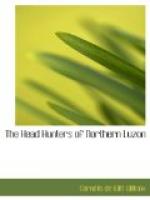If we turn our attention to the other non-Christian elements of the Islands, the case is no better. The Christianized Filipino fears and dreads the pagan mountaineers, the head-hunters who occupy so large a part of Luzon, the largest and most important island of the Archipelago. He grudges every centavo spent under our direction for the betterment of these truly admirable wild men The governor, the Christian governor, of a province bordering on the wild men’s territory, had, indeed, no other idea of the way to treat his pagan neighbors, about 50,000 in number, than to kill them all. His argument was that they were worse than useless, why spend any money on them, when, by exterminating them, all questions affecting them would be forever answered? But, under our administration, some excellent work has been done, and is growing, to turn these as yet unspoiled peoples to account in the destinies of the Archipelago. Independence would mean the end of this work, the restoration of the old order of rapine, murder, and all injustice as between Christians and pagans, and of internecine strife and warfare as between the communities of the pagans themselves. That this result would follow is not even questioned by those who have acquired their knowledge at first hand. Are we willing to shoulder the responsibility of such a result?
We have at our very doors an example of the danger of independence to a people unfilled for the burdens and responsibilities of self-government. We have already since 1900 been compelled once to intervene in the affairs of Cuba: the possibility of a fresh intervention continually stares our statesmen in the face. But Cuba, let it be observed, in contrast with the Philippines, has but one language, one religion; it has no wild tribes, no Mohammedans; its provinces are not separated from one another by seas of difficult navigation, are bound together by suitable communications. The curse of Cuba is personal politics: have we any assurance that this same curse in a worse form would not come to blast the Philippines?




